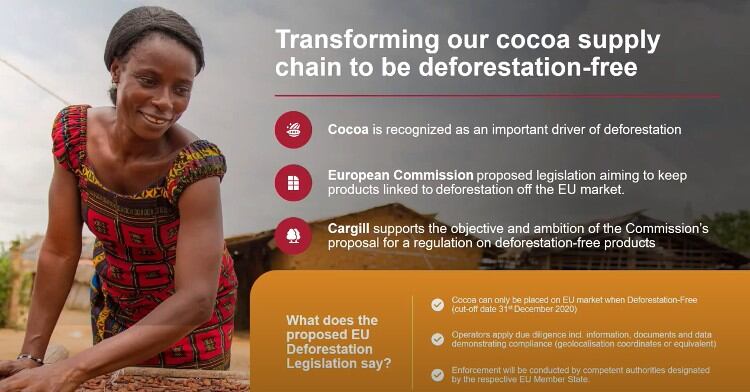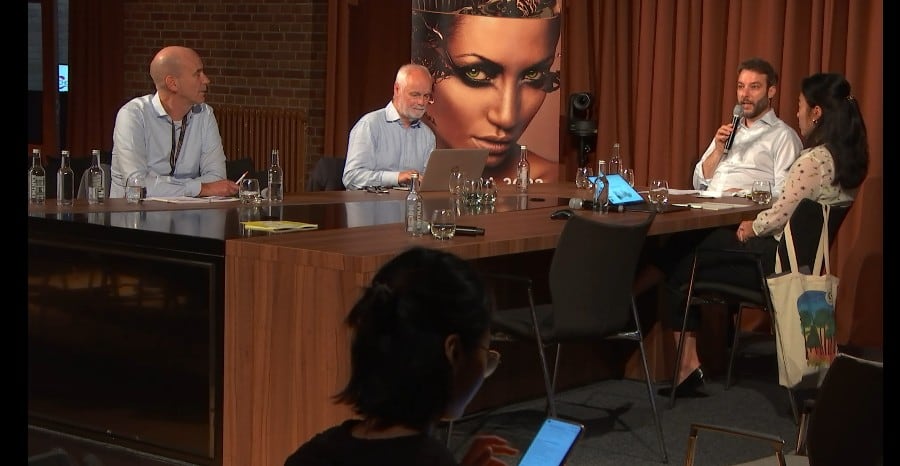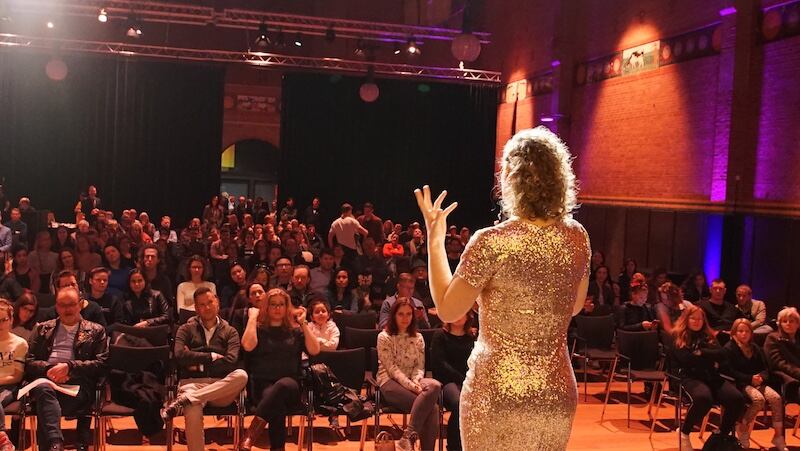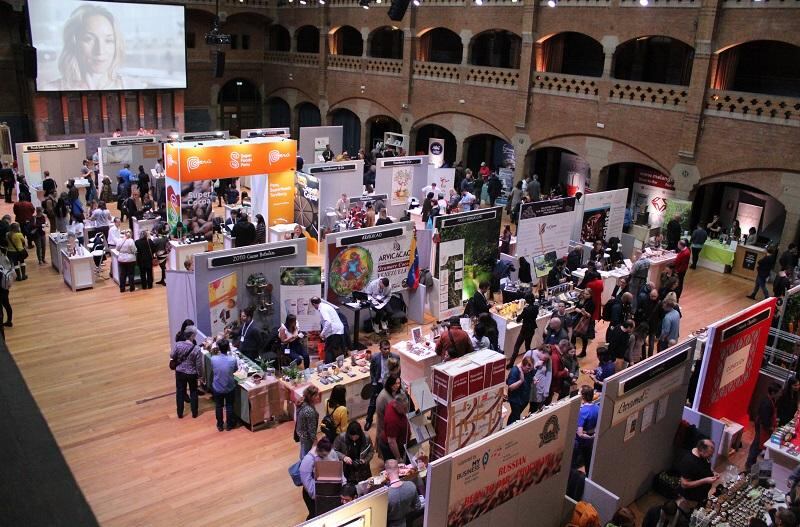Jack Steijn, Director & Co-founder of Equipoise and Chocoa, told ConfectioneryNews the tenth edition of Chocoa was the most difficult from an organisational point of view.
“A hybrid edition doesn’t just mean virtual and presential, there is much more to it. But looking back we can say that our efforts were worth it, as we had very good interaction on the digital platform as well as in the conference room and the trade fair hall. We have been able to develop the event in a very short period, just over two months. This was needed as the risk of organising an international event is still considerable.”
Steijn said they decided in March to aim for a June event. Chocoa usually takes place in Amsterdam’s Beurs van Berlarge venue every February.
Now billed as The Amsterdam Sustainable Cocoa Conference, the three-day networking event discussed topics including cocoa and climate change, transparency of indirectly sourced cocoa, and cocoa innovations.
We have been able to develop the event in a very short period, just over two months. This was needed as the risk of organising an international event is still considerable -- Jack Steijn Director & Co-founder of Equipoise and Chocoa,
Steijn said his team had decided to dedicate the first day to the upcoming EU regulation on company due diligence for deforestation and human rights issues in their supply chains and the second day to agroforestry, including the financial aspects.
“This has really worked,” he said, "with high-quality speakers and good discussions. The same was true for the panels of the Chocolate Makers’ Forum, where we were looking at consumer communication on the sustainability of craft chocolate and increasing the share of cocoa-producing countries in the value chains of craft chocolate.”
Michel Arrion, executive director of the International Cocoa Organisation, set the tone of the conference with a call to triple the price of cocoa prices offered to farmers.
Farmer income
Speaking remotely on Chocoa’s digital platform, Arrion praised Chocoa for its 10 years at the forefront of sustainability discussions.
“I think we have had a lot of discussions over the past decade on sustainability, but I think we have been focusing too much on the symptoms rather than the problems. There has been a lot on deforestation and child labour, but little discussion on poverty, and level of income for farmers.”
While supportive of the Living Income Differential (LID) payments to farmers of $400 per tonne for cocoa crops, he said the scheme has encountered difficulties, with cocoa prices dropping on the markets, sinking farmers into deeper poverty.
“We have not seen projects that have really made a substantial increase for farmers’ incomes. I think that we have to go back to the question on policies. In the end, it comes back to prices - we should be looking to triple the prices of cocoa if we want farmers to receive a decent living income. I don’t think this is unrealistic, as 40 years ago, prices were in fact four times what they are now.”
Arrion told the conference that he backed the impending EU due diligence legislation for deforestation and human rights surrounding all products entering the European trading bloc, a discussion that followed his opening remarks.

Implications of EU legislation: Who will pay the price?
Unprecedented proposals for new legislation will transform commodity supply chains that enter the EU to become more sustainable, the conference was told. EU legislation on deforestation will be the first to be implemented, possibly by the end of this year.
Regis Meritan, a senior advisor at the European Commission, said the issue of low cocoa prices is very important and is down to oversupply in the market.
The EC supports the initiative if the cocoa subject to the LID charge is sustainable. A higher price for a new product that responds to consumer expectations in Europe is acceptable, he said. And the European Cocoa Talks are progressing toward consensus on actions that will create a pathway to more sustainable cocoa.
Sebastiaan van der Hoek, Cargill’s Senior Climate & Land Use Advisor, said his company is supportive of the ambitions and objectives set out in the new EU legislation and the company is fully committed to transforming its global supply chains to become deforestation-free.
Cargill is using GPS Polygon Mapping, with farmers equipped with tools and capabilities to map the boundaries of cocoa farms, he told delegates.
But he warned lawmakers, “the laws must be proportionate, adaptable and implementable and collaborative,” for them to work.
The situation in Latin America is different to Africa, said José Iturríos, Director of the Alliance Cocoa Peru. His region supplies 18% of global cocoa. “The solution that we see to make cocoa more sustainable is an increase in productivity, achievable in Latin America, but what about Africa?”
He called for more support for farmers in the transition and injecting technology to produce more in less space. He said Latin American cocoa farmers have the potential to produce four times more cocoa without cutting down forests.
But what is required from the industry is better financial incentives and better prices for farmers for better cocoa – and to also provide more technical incentives and assistance to farmers.
Human rights
Sarah Dekkiche, Director Policy & Partnerships, International Cocoa Initiative, said the impending EU directive on corporate sustainable due-diligence is basically a request for companies to respect human rights throughout their value chain by conducting ongoing risk-based human rights due diligence.
The European Commission is also committed to introducing legislative proposal that will ban products entering the EU market that are the result of forced labour.
“Any company will have to have a system in place whereby they can identify the risk they pose for the potential on human rights, including child labour and forced labour, which are among the most severe human rights issues in the cocoa sector,” she told Chocoa.
She also said the responsibility is on the company to bear the cost and should be integrated into the management and structure of its operation.
Chocoa 2023
Speaking at the end of this year’s event, Steijn said: “We had exhibitors with cocoa and chocolate from many countries, including Cameroon, Dominican Republic, Ecuador, Ghana, Honduras, Jamaica, Nicaragua, Peru, Uganda and Venezuela and we would have had more if participants that had applied for booths had been able to receive their visa in time.
"We are now hesitating between February 23 or June 22 as opening dates for Chocoa 2023. we need to evaluate the risk. We were quite happy with June, but we are looking for feedback of participants and stakeholders to help us make our final choice.
“Now that we know how it is done, we will opt for the hybrid version again. The impact of Covid-19 has been hard and many people will still not be able to afford travelling to Europe.”



